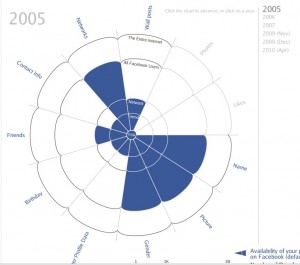danah boyd is one of the sanest and best-informed observers of social networking. This is a good (but too brief) Technology Review interview with her on the subject. Sample:
Danah Boyd: People started out with a sense that this is just for you and people in your college. Since then, it’s become just for you and all your friends. It slowly opened up and in the process people lost a lot of awareness of what was happening with their data. This is one of the things that frightens me. I started asking all of these nontechnological people about their Facebook privacy settings, and consistently found that their mental model of their privacy settings and what they saw in their data did not match.
TR: What’s been driving these changes for Facebook?
DB: When you think about Facebook, the market has very specific incentives: Encourage people to be public, increase ad revenue. All sorts of other things will happen from there. The technology makes it very easy to make people be as visible and searchable as possible. Technology is very, very aligned with the market.
TR: Some people dismiss concerns about this sort of situation by saying that privacy is dead.
DB: Facebook is saying, “Ah, the social norms have changed. We don’t have to pay attention to people’s privacy concerns, that’s just old fuddy-duddies.” Part of that is strategic. Law follows social norms.
TR: What do you think is actually happening to the social norms?
DB: I think the social norms have not changed. I think they’re being battered by the way the market forces are operating at this point. I think the market is pushing people in a direction that has huge consequences, especially for those who are marginalized.

